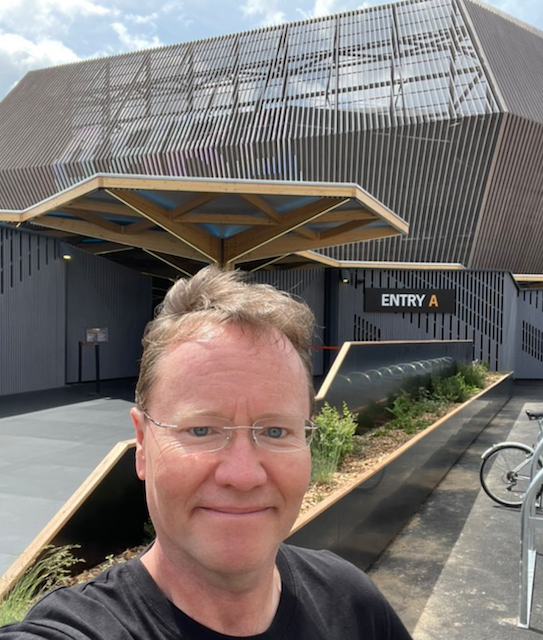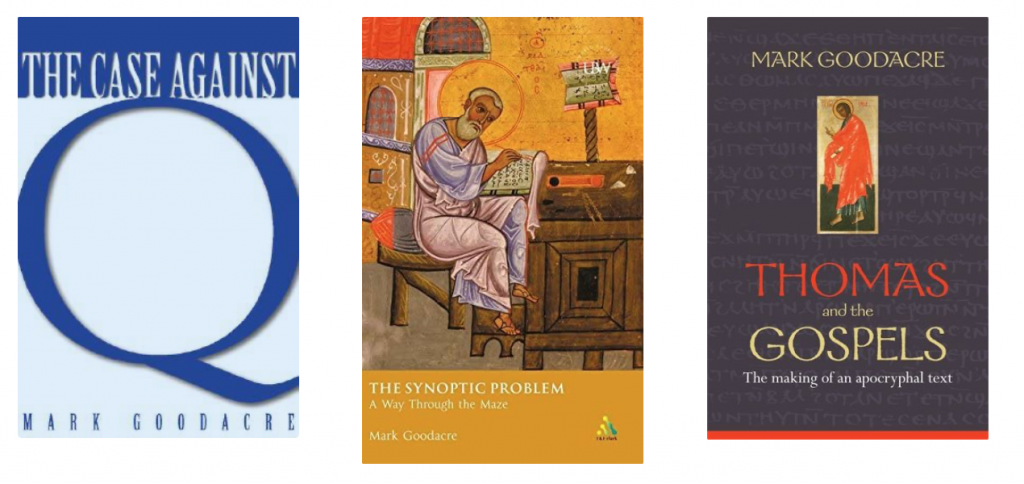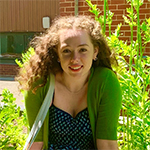This is part two of a two-part series; last week we looked at what biblical research is and why it matters—this week we’re looking at how it’s conducted.
“Sometimes I have to take a running start to the word ‘religion,'” says Mark Goodacre, chair of the religious studies department at Duke.
A beautiful sentiment.
He corrects himself: “That is, I have trouble saying the word itself. I often have to stop and think so I don’t stumble over it.”
A considerate pause: “Department of…Re-lig-ious Studies*.* There we go.”
Goodacre has a podcast about the New Testament. His students have admitted to using his calming British timbre to lull themselves into a sense of peace. When I met with him over Zoom, he was back in Cambridge visiting his brand-new granddaughter. Other than being one of the world’s most forefront New Testament scholars, he is also an ABBA superfan.

Goodacre consulted on the Gospel of Matthew for the New Revised Standard Version Updated Edition—the most modern scholarly edition of the Bible. He argued to the board that the commonly translated “leper” should be considered “person with leprosy” and “deaf-mute” as “person who could neither see nor hear.”
Goodacre is one of hundreds of New Testament scholars around the world who are working towards a greater understanding of historical and theological Christianity.
Coming from outside the world of biblical research, it may be difficult to understand the relationship between religious texts and academia. You can think of it like this: in an academic setting, the Bible is heavily seasoned with nuance, slow-roasted for decades at a time, pulled apart, chopped into little chunks of knowledge, placed in boiling vats of outside context, and served objectively with a fresh garnish of analysis.
“You’re taking the tools you have in the arts and sciences, and you’re not treating religious texts any differently,” Goodacre says. “People often think you have to treat sacred things differently, but they are still the product of human beings in specific contexts at specific points in history. Subject them to proper scrutiny— like you would to any modern writer.”
Last week, we looked at why biblical research matters. But perhaps that relationship goes both ways; researchers are constantly inspired by the world of arts and sciences, the conversations they have with students—and more than that, current events. Today, as much as in any decade, the Bible is a central topic of debate in public policy and ethical issues that affect people all over the world. Goodacre gives us some examples:
“For example, take slavery in America; sometimes the same passage in the Bible would be referred to by both abolitionists and slave owners. Modern scholars are able to provide context to those passages and truly defend the arguments of abolitionists.”
As a Brit, Goodacre finds the American separation of church and state an interesting concept. As a scholar, he is able to provide context and voice to arguments made on both sides.
“It is healthy for our politics and culture to have people who can have intelligent discussions about the Bible in issues in our courts like marriage, divorce, sexuality, abortion.”
Goodacre makes sure to teach historical analysis tools in his classes. Among those tools include the ability to view texts from different perspectives; beyond being able to step away from politics to provide an outside view, scholars also need to be able to get even closer to the text. Different views on the text have been the consensus at different points in history, and often scholars find reasons to visit and revisit translations and interpretations for different analyses.

For example, Goodacre teaches a class at Duke called Jesus and Film, and in the class he repeatedly revisits the issue of the persistent white, European Jesus depiction in even modern art. Since graduating from Oxford years ago, he has revisited the same material he once studied with a feminist perspective despite being taught it in a male-dominated space.
“For someone like me who went to grad school a few decades ago,” he says, “it’s a liberating thing to take feminist and racial perspectives with the weight they deserve.”
What does this have to do with us non-religious studies folks? Perhaps some of us follow the scientific method to conduct our experiments, others the engineering method and even others use literary analysis or investigation methods or whatever we need to get to the root of a problem. All of these methods and more are encompassed within the realm of religious studies and biblical research; by looking at a problem from all angles, and without treating sanctity as an exception to scrutiny, scholars are able to work.

